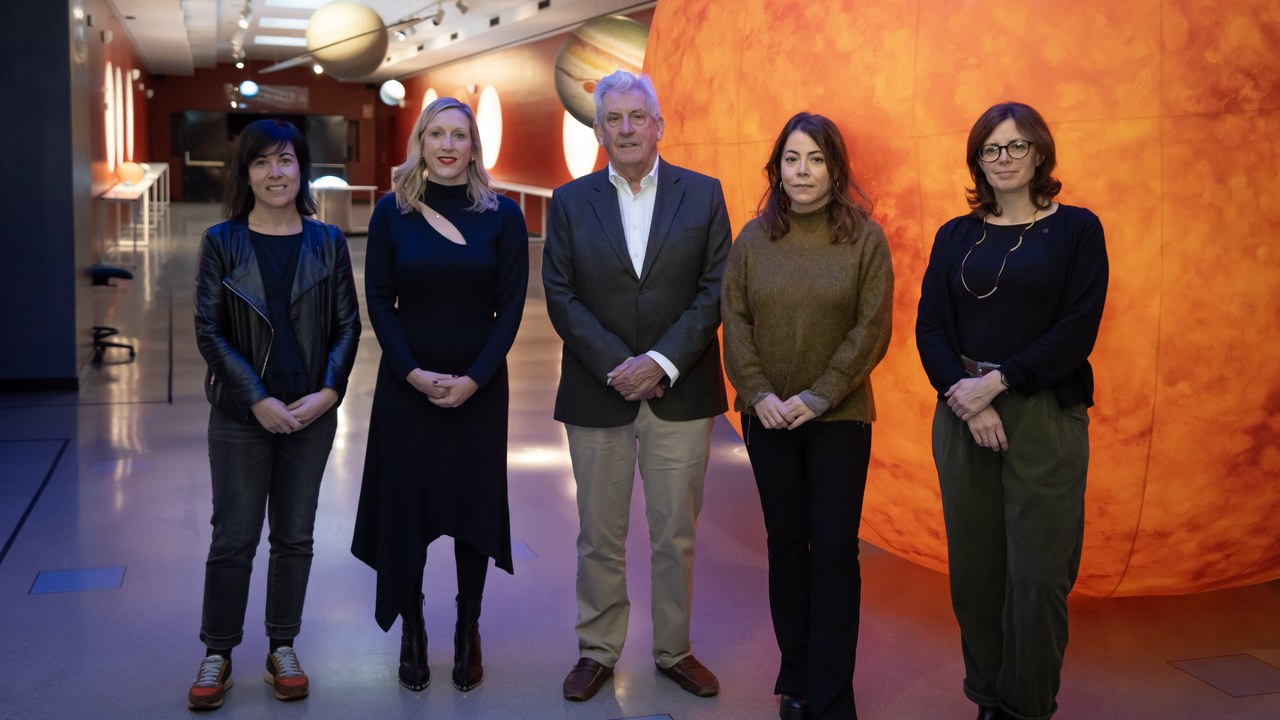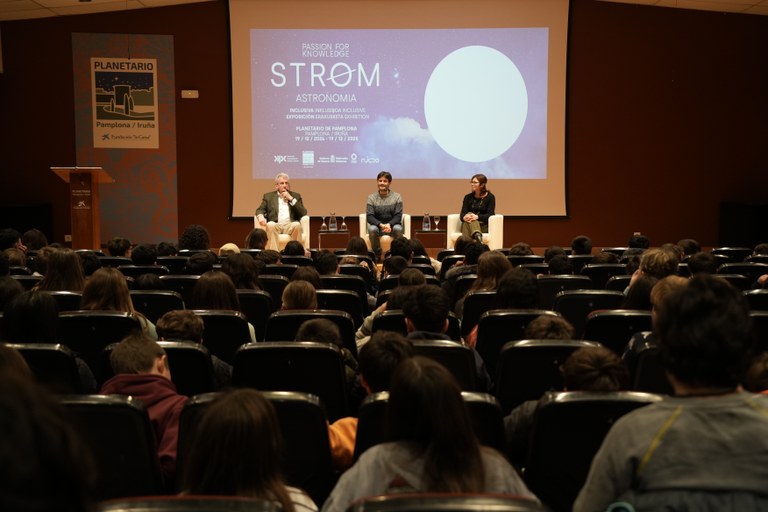The exhibition "STROM - Inclusive Astronomy" by DIPC opens today at the Pamplona Planetarium
The exhibition “STROM – Inclusive Astronomy”, created by DIPC as part of the Passion for Knowledge festival, invites visitors to explore the cosmos through tactile, sound and audiovisual experiences.

This morning, the Pamplona Planetarium was the setting for the presentation of “STROM - Inclusive Astronomy” a multi-sensorial, inclusive exhibition created by the Donostia International Physics Center (DIPC) on the occasion of the Passion for Knowledge festival; it is being hosted by the Pamplona Planetarium after first being staged at Tabakalera, Donostia / San Sebastian.
STROM invites visitors to explore the cosmos through tactile, sound and audiovisual experiences with the aim of guaranteeing access to science for all citizens without barriers of any kind.
The opening ceremony was divided into two parts. Firstly, a presentation was given on the same premises where the exhibition is located. The following people attended: Paula Noya, Head of Cultural Infrastructures of NICDO; Patricia Fanlo, regional minister for Universities, Innovation and Digital Transformation of the Government of Navarre; Pedro Miguel Etxenike, president of the DIPC and professor emeritus of the University of the Basque Country (UPV/EHU), and Izaskun Azcona, La Caixa Foundation’s representative in Navarre.
Paula Noya, Head of Cultural Infrastructures of NICDO, opened the floor to the speakers. After welcoming and thanking everyone present, she stressed the importance of hosting projects such as STROM: “Hosting an exhibition of this kind at the Pamplona Planetarium is very important as it is in line with our values relating to education, scientific dissemination and the promotion of equal opportunities. There are not many exhibitions like STROM that are inclusive, that support and bring science without barriers to all members of the public.”
She then handed over to Patricia Fanlo, regional minister for Universities, Innovation and Digital Transformation of the Government of Navarre; Fanlo underlined the crucial role of science and innovation as drivers of progress in society.
“At the Government of Navarre we are keen to promote programmes designed to awaken an interest in science and technology from an early age in all boys and girls. The astronomy exhibition STROM, which we are presenting at the Pamplona Planetarium, encourages STEM (Science, Technology, Engineering and Mathematics) vocations in various ways. It is not only a space for observation, but also organises workshops, talks and practical activities in which visitors can experiment, ask questions and learn directly. These experiences strengthen their connection with STEM disciplines and allow them to visualise themselves as future professionals in the field of science and technology.”
The third turn corresponded to Izaskun Azcona, La Caixa Foundation’s representative in Navarre, who put the finishing touches on the speeches by highlighting the value and importance of the inclusive dissemination and social impact of projects of this type: “We have been working with the Pamplona Planetarium for many years and at La Caixa Foundation we are committed to the transformative power of education, as demonstrated by our collaboration with the Pamplona Planetarium in the Izar Eskola programme. This alliance fosters an interest in science, curiosity and equal opportunities by bringing together science, popularisation and education. We share with the Planetarium the aim to create a space for critical reflection that addresses issues of great social impact and concern for today’s human beings, coupled with a transversal approach that combines science, popularisation and education. Thank you very much indeed,” she concluded.
Finally, Pedro Miguel Etxenike, president of the DIPC and emeritus professor of the UPV/EHU, expressed his delight at the hosting of the exhibition at the Pamplona Planetarium, and highlighted his affection for this centre: “Science is a transformative seed that is fundamental in achieving more cultured and more democratic societies. And astronomy, in particular, is an excellent vehicle for awakening a curiosity about science, especially among the younger generations. STROM fulfils all these aims, and is also concerned to include people with different abilities, which is a responsibility that both the DIPC and the Pamplona Planetarium have decided to actively assume.”
Discussion with the students of the Arizmendi Ikastola

After the speeches, a discussion was held with the students of the Arizmendi Ikastola (Basque-medium school) in the Ibn´Ezra room. The 12-year-old students, in year 1 of secondary education, visited the Planetarium as part of the Star School and, during the visit, on the occasion of the presentation of STROM (an activity included in the school programme), they were able to share their concerns with Pedro Miguel Etxenike and Silvia Bonoli, astrophysicist and Ikerbasque research professor at the DIPC and scientific curator of STROM, who also participated in the talk chaired by the Planetarium's astrophysicist, Iñaki Ordoñez.
An accessible, multi-sensory tour of the cosmos
The “STROM - Inclusive Astronomy” exhibition is the result of an international collaboration bringing together experts in inclusive astronomy from different parts of the world. They include the UPV/EHU, the International Astronomical Union, the Giant Magellan Telescope, the Planetarium of Medellín and the Diego Portales University of Chile.
Thanks to this joint effort, the DIPC has managed to turn a project that guarantees an accessible, multi-sensory and educational experience, a reality bringing knowledge of the cosmos to all members of the public. With its arrival at the Pamplona Planetarium, the exhibition reaffirms the centre's commitment to science without barriers, accessible and inspiring for everyone.
Those who come to find out about the exhibition will be able to experience a multi-sensory journey through the cosmos. It consists of several zones offering various sensory experiences. Among the various elements on show, visitors will find tactile panels where they can explore the shapes of galaxies and constellations with their fingers, they will have the opportunity to get to know the sounds of the Universe by listening to phenomena such as the activity of the Sun, and be able to witness fascinating processes, such as the birth of a black hole.
In short, this innovative proposal offers an inclusive, immersive way of discovering the immensity of the Universe, ensuring that science is accessible to everyone, regardless of their abilities.
Tickets are now available on the Planetarium's website and can also be purchased at the Planetarium ticket office.
Admission is free and includes the option of a guided tour for 3 euros. There is also a discount for groups of four people who wish to enjoy the guided content for 10 euros.
The aim of the “STROM - Inclusive Astronomy” exhibition is to guarantee universal accessibility, and so admission, which includes a guided tour, will be free of charge for people with functional diversity, thus ensuring that they can fully enjoy this experience.
